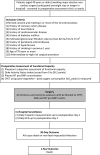Measurement of Exercise Tolerance before Surgery (METS) study: a protocol for an international multicentre prospective cohort study of cardiopulmonary exercise testing prior to major non-cardiac surgery
- PMID: 26969643
- PMCID: PMC4800144
- DOI: 10.1136/bmjopen-2015-010359
Measurement of Exercise Tolerance before Surgery (METS) study: a protocol for an international multicentre prospective cohort study of cardiopulmonary exercise testing prior to major non-cardiac surgery
Erratum in
-
Correction. Measurement of Exercise Tolerance before Surgery (METS) study: a protocol for an international multicenter prospective cohort study of cardiopulmonary exercise testing prior to major noncardiac surgery.BMJ Open. 2016 Apr 26;6(4):e010359corr1. doi: 10.1136/bmjopen-2015-010359corr1. BMJ Open. 2016. PMID: 27118283 Free PMC article. No abstract available.
Abstract
Introduction: Preoperative functional capacity is considered an important risk factor for cardiovascular and other complications of major non-cardiac surgery. Nonetheless, the usual approach for estimating preoperative functional capacity, namely doctors' subjective assessment, may not accurately predict postoperative morbidity or mortality. 3 possible alternatives are cardiopulmonary exercise testing; the Duke Activity Status Index, a standardised questionnaire for estimating functional capacity; and the serum concentration of N-terminal pro-B-type natriuretic peptide (NT pro-BNP), a biomarker for heart failure and cardiac ischaemia.
Methods and analysis: The Measurement of Exercise Tolerance before Surgery (METS) Study is a multicentre prospective cohort study of patients undergoing major elective non-cardiac surgery at 25 participating study sites in Australia, Canada, New Zealand and the UK. We aim to recruit 1723 participants. Prior to surgery, participants undergo symptom-limited cardiopulmonary exercise testing on a cycle ergometer, complete the Duke Activity Status Index questionnaire, undergo blood sampling to measure serum NT pro-BNP concentration and have their functional capacity subjectively assessed by their responsible doctors. Participants are followed for 1 year after surgery to assess vital status, postoperative complications and general health utilities. The primary outcome is all-cause death or non-fatal myocardial infarction within 30 days after surgery, and the secondary outcome is all-cause death within 1 year after surgery. Both receiver-operating-characteristic curve methods and risk reclassification table methods will be used to compare the prognostic accuracy of preoperative subjective assessment, peak oxygen consumption during cardiopulmonary exercise testing, Duke Activity Status Index scores and serum NT pro-BNP concentration.
Ethics and dissemination: The METS Study has received research ethics board approval at all sites. Participant recruitment began in March 2013, and 1-year follow-up is expected to finish in 2016. Publication of the results of the METS Study is anticipated to occur in 2017.
Keywords: Cardiopulmonary exercise testing; Natriuretic peptides; Postoperative complications; Preoperative assessment; Risk prediction.
Published by the BMJ Publishing Group Limited. For permission to use (where not already granted under a licence) please go to http://www.bmj.com/company/products-services/rights-and-licensing/
Figures
References
-
- Fleisher LA, Fleischmann KE, Auerbach AD et al. . 2014 ACC/AHA guideline on perioperative cardiovascular evaluation and management of patients undergoing noncardiac surgery: a report of the American College of Cardiology/American Heart Association Task Force on Practice Guidelines. Circulation 2014;130:e278–333. 10.1161/CIR.0000000000000106 - DOI - PubMed
-
- Kristensen SD, Knuuti J, Saraste A et al. . 2014 ESC/ESA Guidelines on non-cardiac surgery: cardiovascular assessment and management. The Joint Task Force on non-cardiac surgery: cardiovascular assessment and management of the European Society of Cardiology (ESC) and the European Society of Anaesthesiology (ESA). Eur Heart J 2014;35:2383–431. - PubMed
Publication types
MeSH terms
Substances
Grants and funding
LinkOut - more resources
Full Text Sources
Other Literature Sources
Medical
Research Materials

